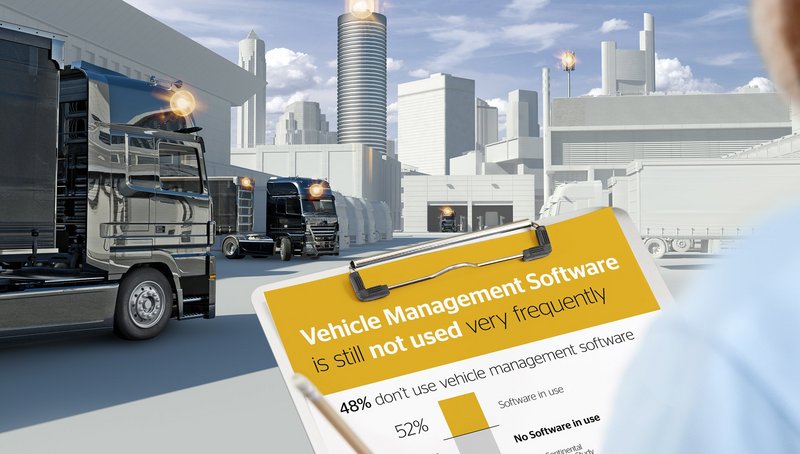Logistics Industry Wants Clearly Structured Software Solutions Instead of a Software Jungle
- Standardization requested instead of closely manufacturer-related systems
- Special focus on data protection alongside data transparency
- Continental Mobility Study illustrates demand for wide-ranging real-time Information
Hanover, September 2016. Software is the new wheel of industry, but in the logistics sector, this wheel is evidently not quite turning properly yet. According to the “Continental Mobility Study 2016”, an abundance of very different standards, interfaces, and systems is creating a lack of clarity and excessive strain on the market. As a result, more than half of the logisticians surveyed in the study fear that the industry could get left behind as digitalization progresses. A fifth see no opportunities for the sector in digitalization. Meanwhile, 9% of logisticians even say that they cannot think of anything relating to digitalization happening yet.
"Too expensive, too big, too sluggish, too dependent on data centers, not mobile-compatible, not user-optimized, stand-alone solutions," according to one summary of criticism leveled at the services on offer. "For us, that means that we have to make our own adjustments and find a software solution for every customer. The attempt to standardize a wide range of transport management software failed catastrophically," says one expert. It is believed that providers need to offer uniform, suitable standards and compatibility irrespective of the manufacturer. "We expect neutrality and universal applicability. That incorporates being open to other manufacturers as well", says the study, as well as "We value independence. What we want are neutral third-party providers focusing on logistics and real-life situations."
At present, only 25% of respondents have software solutions for fleet management on their wishlists. The top priorities are fuel-saving technologies and advanced driver assistance systems, with 66% in favor of each. However, tracking for individual goods, or software for logistics management are also rated as important. Their importance tends to be considered greater in China than in Germany. Slightly less than half of companies do not use such software at all; this applies to small companies in particular. "Fleet management is not yet in place. However, it is highly relevant to mixed fleets of purchased and leased vehicles, as well as those of subcontractors," comments one fleet manager.
Software applications that directly involve drivers enjoy significantly higher acceptance.
Some 61% of logistics experts surveyed regard software for road performance as very important, the figures rising to 66% for software to be used by drivers and 85% for software to aid driver comfort and convenience. However, roughly a third of companies do not use such applications. Where applications are used, they overwhelmingly meet with satisfaction.
"It is important to us to monitor a vehicle's consumption. We are concerned not with keeping an eye on the driver as a person but with tracking the driving situation," comments an expert in the study. "More intuitive solutions, graphics or signals that show how I could drive more effectively and simultaneously provide encouragement for the driver to do so as well," requests another.
The expert expresses interest in applications that improve the flow of data between truck, trailer, and platforms. "Drastic improvements and better solutions are required here; otherwise, the actual realities of transport will thwart progress. For example, the way in which real-time information is processed is poor, and too slow. Manufacturers retain important vehicle data in external telematics; this means that the analyses are suitable only for their own vehicles and do not function satisfactorily for third-party brands or in interaction with third-party brands," says the study.
The logisticians see intelligent interlinking of all process stages as a particularly important task. "Individual process stages are currently being optimized. The final mile is already very well interconnected. However, efficiency and, in particular, benefit to end customers still need to be reinforced."
Special attention is paid to the security of customer and company data, as well as that of vehicles and the goods themselves. "We transport a great deal of valuable goods. "We need to ensure security at all levels," reports the study. Commercial vehicle manufacturers are very conscious of this. "At present, communication is something of a “one-way street” from the truck. In the future, data transport in the truck will be increased, and by then at the latest, software security will become enormously important. If a truck can be deliberately shut down from outside in the future, for example, it must not be possible for risks to be incurred in the process," comments an expert from a manufacturer quoted in the study.
With the "Mobility Study 2016 – The Connected Truck," the leading technology company Continental is presenting what is now its fourth mobility study. The market and social research institute (infas) surveyed logisticians, forwarding agents, fleet operators, and long-haul drivers in Germany and China. The focus was on the challenges faced by the logistics sector as a result of digitalization and connectivity.
Facts and figures regarding software
- The market potential for new hardware as a result of autonomous driving is estimated at roughly $40 billion by 2030. The potential for software is expected to reach $20 billion by 2030.
Source:http://de.statista.com/statistik/daten/studie/453975/umfrage/autonome-fahrzeuge-marktpotenzial-hard-und-software-bis-2030/
- Transport Industry in the Digital Price Trap
- Competition, Cost Pressure, Scarce Funds: Challenging Conditions for the Logistics Industry
- The Logistics Industry Is Worried About Digitalization and Is Looking for the Right Approach
- Logistics Sector Urgently Awaits Innovative Electric Mobility Solutions from Manufacturers
- Automated Driving Still a Long Way off for the Logistics Industry
- Logistics Industry Wants Clearly Structured Software Solutions Instead of a Software Jungle
- Working as a Trucker: Day-to-Day Mixture of Dream Job and Self-Exploitation


